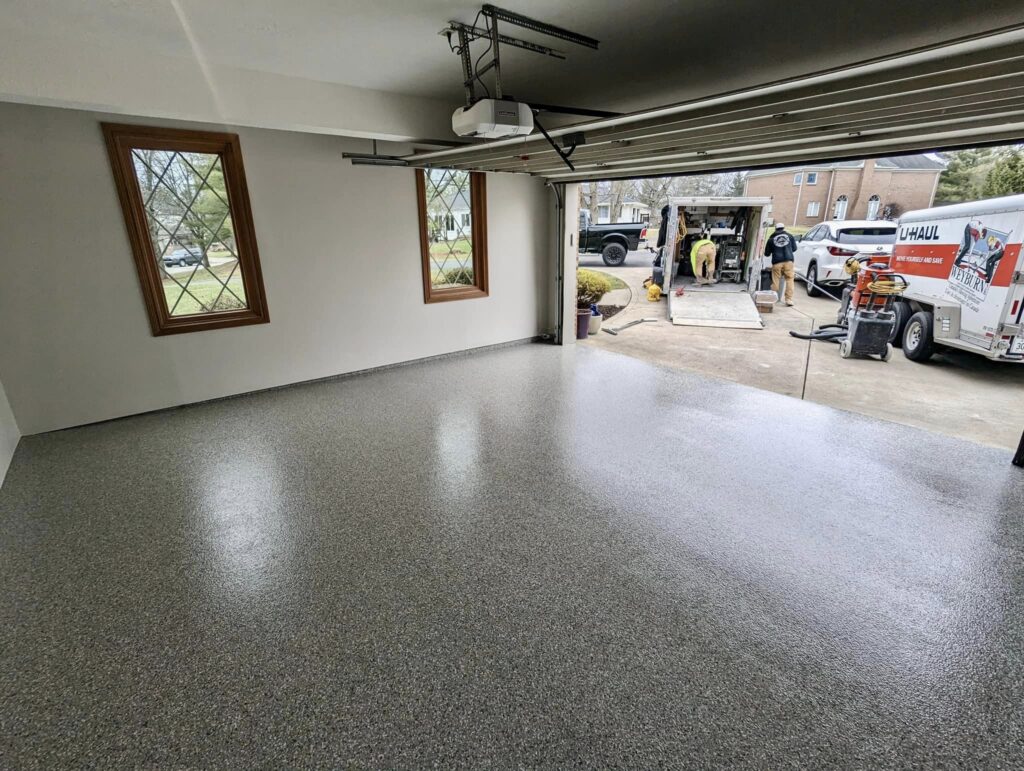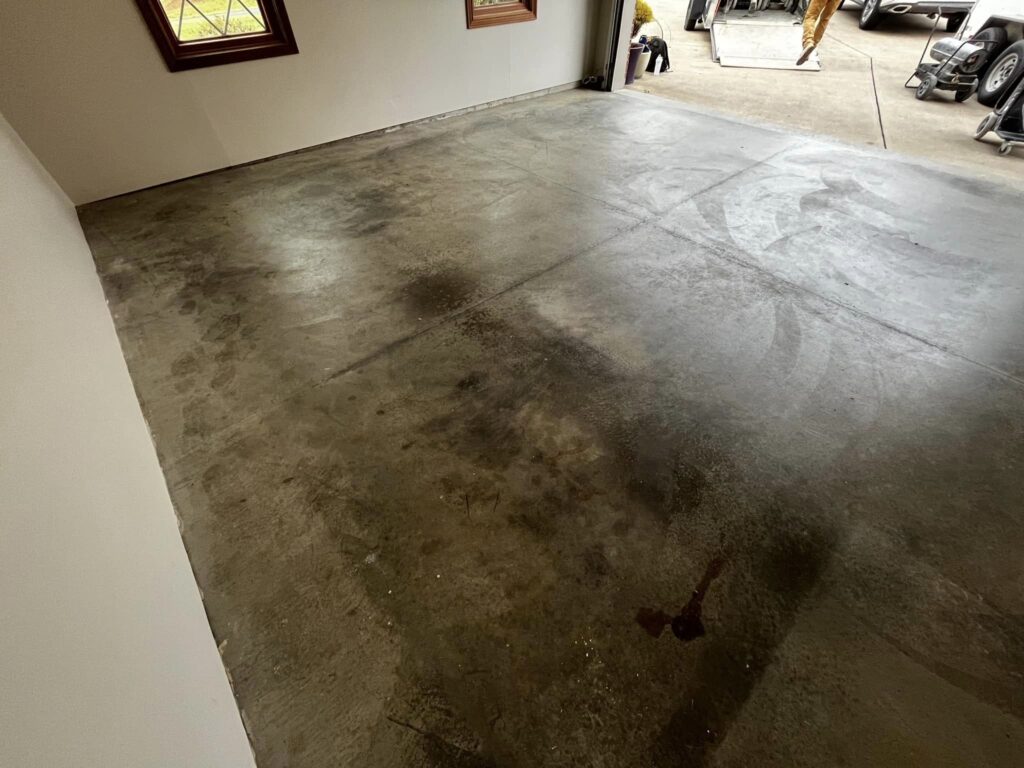Your basement may be the hidden gem of your home just waiting to be discovered. Whether it’s for additional living space, a storage area, or a workshop – the right touch can transform your dungeon-like downstairs into an integral part of your living environment. One often overlooked but vital step in this transformation is the application of a durable and aesthetically pleasing basement floor coating. This comprehensive guide is made to help West Chester Township residents understand the nuances, benefits, and steps involved in carrying out this crucial enhancement.
Understanding Basement Floor Coating
Considering a basement floor coat represents an investment that can protect, preserve, and enhance the value of your home. From epoxy to vinyl and everything in between, the right basement floor coating can offer protection against moisture, improve the cleaning process, and turn a utilitarian space into an inviting one.
What is Basement Floor Coating?
Basement floor coating is a protective and aesthetic refinement to your basement floor. It’s a sturdy, liquid application that hardens into a seamless, durable, and often moisture-resistant surface, designed to shield your floor against stains, chemicals, and everyday wear. The process involves meticulous floor preparation, strategic application, and careful curing to ensure the best results.
Types of Coatings and Their Suitability
There are several types of coatings, each with its own set of advantages. For example, epoxy coatings are incredibly strong and can be used with color chips or metallic pigments to create a variety of designs. Polyaspartic coatings are fast-curing, making them ideal for quick projects. Polyurea coatings are similar to polyaspartic but with added flexibility. Acrylic coatings are water-based and offer a more natural look.
The choice of coating depends on factors like the basement’s use, the level of moisture, and the desired aesthetics. West Chester Township residents must consider the area’s specific environmental conditions and choose a coating that can withstand the local climate and potential flooding risks associated with this region.
Why You Should Coat Your Basement Floor
Understanding the reasons behind coating your basement floor is crucial for any homeowner looking to make an informed decision.
For Protection
An unfinished basement floor is vulnerable to moisture seepage, which can lead to mold and mildew. Coating the floor creates a protective barrier that prevents water from penetrating and damaging your property. Additionally, it guards against chemical spills and stains, which can be common in a storage or workshop environment.
Aesthetic Enhancement
A coated basement floor is much easier to clean and maintain than bare concrete. It also reflects light, brightening the space and making it more inviting. For homeowners turning their basements into living areas, this can be especially beneficial, creating a clean, stylish backdrop for any room design.
Longevity and Value
A coated floor is more durable and less prone to damage than untreated concrete. This means a longer lifespan for your basement floor, which is a significant advantage for any homeowner. Longevity and aesthetic appeal can both enhance the value of your home, a particularly attractive aspect if you’re considering selling in the future.
Local Testimonials
Given the region’s propensity for fluctuating weather and the occasional storm, local testimonials can offer insight into the practical benefits of basement floor coating in West Chester Township.
Preparing Your Basement for Coating
Preparation is key to a successful basement floor coating project. This section discusses the necessary steps to ready your floor for coating.
Steps to Preparation
Preparing your basement floor includes removing all items from the area, thoroughly cleaning the surface, and repairing any cracks or damage. This is also the time to consider whether the floor requires waterproofing measures, as addressing any moisture issues before coating is essential.
Cleaning and Repairing
A clean, smooth surface is crucial for the coating to adhere properly. Use a combination of degreasers and etching solutions to clean the concrete thoroughly. For repairs, fill any cracks and level uneven areas with an appropriate compound.
Priming the Floor
A primer helps the coating bond to the concrete and can also act as an additional moisture barrier where necessary. Choosing the right primer is an important decision, as it needs to be compatible with the coating material and the specific conditions in your basement.
The Coating Process
Once the preparation is complete, it’s time to apply the coating. This section provides a detailed look at what this process entails.
Tools and Materials
The tools you’ll need depend on the type of coating you choose. Generally, you’ll require a variety of brushes, rollers, and potentially a squeegee for the application. Safety equipment such as gloves, goggles, and a respirator is also essential when working with chemicals.
Application Technique
The application technique is critical in achieving an even, durable finish. Whether rolling the epoxy, spreading a polyurea compound, or brushing on an acrylic coat, each step must be executed with precision.
Safety Considerations
Working with coatings can involve potentially dangerous chemicals. Ensuring the workspace is well-ventilated, using the appropriate protective gear, and following all manufacturer’s instructions is non-negotiable.
Aftercare and Maintenance
Applying a coating is just the first step – maintaining it is equally important for long-term benefits.
Post-Application Care
After the coating is applied, it needs to cure properly. This usually involves avoiding foot traffic and heavy weights for a specific period. Once cured, the floor should be cleaned according to the manufacturer’s guidelines to keep it in top condition.
Long-Term Maintenance
Regular inspections for any damage or wear, reapplication of a topcoat if necessary, and addressing any issues as they arise will ensure that your basement floor coating lasts for many years.
Choosing the Right Professional or DIY Project
Deciding whether to coat your basement floor yourself or hire a professional is a significant consideration.
DIY or Professional Help?
The decision comes down to your experience and the complexity of the project. DIY can save money, but professionals have the expertise to handle more challenging jobs and provide warranties on their work.
Local Professional Recommendations
For those leaning toward professional help, this section lists reputable local contractors specialized in basement floor coating. Checking references and verifying their credentials is a must before making a commitment.

Conclusion
In conclusion, basement floor coating is an investment that can significantly enhance your home in a variety of ways. It offers protection against moisture, chemicals, and stains, improves aesthetics, and can increase the value of your property.
Action Steps
If you’re ready to explore your basement’s potential, the next step is to research the best coating options for your space. Whether you choose to do it yourself or hire a professional, basement floor coating in West Chester Township is a decision you won’t regret.
Your Feedback
We’d love to hear your thoughts on this guide. Do you find it helpful? Are there other topics you’d like us to cover related to home improvement in the West Chester area? Your feedback is invaluable.

